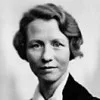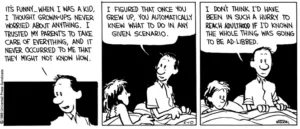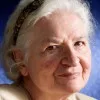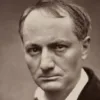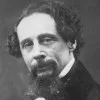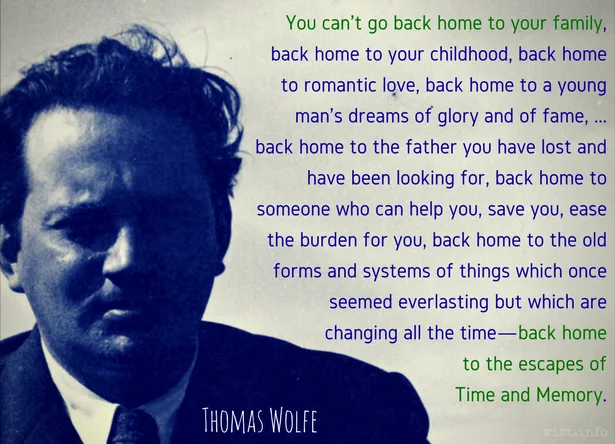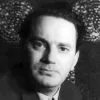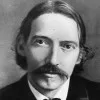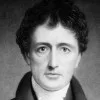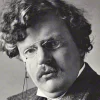The fault no child ever loses is the one he was most punished for.
Mignon McLaughlin (1913-1983) American journalist and author
The Neurotic’s Notebook, ch. 2 (1963)
(Source)
Quotations about:
childhood
Note not all quotations have been tagged, so Search may find additional quotes on this topic.
Was it for this I uttered prayers,
And sobbed and cursed and kicked the stairs,
That now, domestic as a plate,
I should retire at half-past eight?Edna St. Vincent Millay (1892-1950) American poet
Poem (1920), “Grown-Up,” A Few Figs from Thistles, (1921, expanded ed.)
(Source)
The poem was not in the original 1920 publication.
At home we read Pinocchio instead. We read Black Beauty, Doctor Dolittle, Little Women, The Adventures of Huckleberry Finn. What I learned about darkness from stories, I learned from books like these — and also from the unedited works of the Brothers Grimm and Hans Christian Andersen.
According to a recent article in the New York Times, few parents expose their children to those works in the original these days, and some of their reasons make sense. Who wants children growing up with the idea that stepmothers are wicked, ugly people are evil, women can get by on their beauty, and princesses are all white? At the same time, I worry about children who grow up thinking that every story has a happy ending and no one gets permanently hurt along the way.Barbara Brown Taylor (b. 1951) American minister, academic, author
Learning to Walk in the Dark, ch. 1 (2014)
(Source)
I was not born happy. As a child, my favourite hymn was: ‘Weary of earth and laden with my sin’. At the age of five, I reflected that, if I should live to be seventy, I had only endured, so far, a fourteenth part of my whole life, and I felt the long-spread-out boredom ahead of me to be almost unendurable. In adolescence, I hated life and was continually on the verge of suicide, from which, however, I was restrained by the desire to know more mathematics.
Bertrand Russell (1872-1970) English mathematician and philosopher
Conquest of Happiness, Part 1, ch. 1 “What Makes People Unhappy” (1930)
(Source)
PETER: Because I heard father and mother talking of what I was to be when I became a man. I want always to be a little boy and to have fun; so I ran away to Kensington Gardens and lived a long time among the fairies.
J. M. Barrie (1860-1937) Scottish novelist and dramatist [James Matthew Barrie]
Peter Pan, Act 1 (1904, pub. 1928)
(Source)
In Barrie's 1911 novelization, Peter and Wendy, ch. 3 "Come Away, Come Away!" this is rendered:“It was because I heard father and mother,” he explained in a low voice, “talking about what I was to be when I became a man.” He was extraordinarily agitated now. “I don’t want ever to be a man,” he said with passion. “I want always to be a little boy and to have fun. So I ran away to Kensington Gardens and lived a long long time among the fairies.”
All children, except one, grow up. They soon know that they will grow up, and the way Wendy knew was this. One day when she was two years old she was playing in a garden, and she plucked another flower and ran with it to her mother. I suppose she must have looked rather delightful, for Mrs. Darling put her hand to her heart and cried, “Oh, why can’t you remain like this for ever!” This was all that passed between them on the subject, but henceforth Wendy knew that she must grow up. You always know after you are two. Two is the beginning of the end.
J. M. Barrie (1860-1937) Scottish novelist and dramatist [James Matthew Barrie]
Peter and Wendy, ch. 1 “Peter Breaks Through” (1911)
(Source)
Opening words, not included in the play.
Youth smiles without any reason. It is one of its chiefest charms.
Oscar Wilde (1854-1900) Irish poet, wit, dramatist
The Picture of Dorian Gray, ch. 14 (1891)
(Source)
You do not chop off a section of your imaginative substance and make a book specifically for children, for — if you are honest — you have no idea where childhood ends and maturity begins. It is all endless and all one.
P. L. Travers (1899-1996) Australian-British writer [Pamela Lyndon Travers; b. Helen Lyndon Goff]
Essay (1978-07-02), “I Never Wrote for Children,” New York Times
(Source)
But the mere fact that you hear this or that judgement as the voice of conscience, and that consequently you feel a thing to be right, may be due to the fact that you have never given the matter much thought, and have blindly accepted from your childhood whatever you were told was right.
[Dass du aber diess und jenes Urtheil als Sprache des Gewissens hörst, also, dass du Etwas als recht empfindest, kann seine Ursache darin haben, dass du nie über dich nachgedacht hast und blindlings annahmst, was dir als recht von Kindheit an bezeichnet worden ist.]Friedrich Nietzsche (1844-1900) German philosopher and poet
The Gay Science [Die fröhliche Wissenschaft], Book 4, § 335 (1882) [tr. Hill (2018)]
(Source)
Also known as La Gaya Scienza, The Joyful Wisdom, or The Joyous Science.
(Source (German)). Alternate translations:But that you hear this or that judgment as the voice of conscience, consequently, that you feel a thing to be right -- may have its cause in the fact that you have never reflected about yourself, and have blindly accepted from your childhood what has been designated to you as right.
[tr. Common (1911)]But that you take this or that judgment for the voice of conscience -- in other words, that you feel something to be right -- may be due to the fact that you have never thought much about yourself and simply have accepted blindly that what you had been told ever since your childhood was right.
[tr. Kaufmann (1974)]But that you hear this or that judgement as the words of conscience, i.e., that you feel something to be right may have its cause in your never having thought much about yourself and in blindly having accepted what has been labeled right since your childhood.
[tr. Nauckhoff (2001)]
CALVIN: Dad, how come old photographs are always black and white? Didn’t they have color film back then?
CALVIN’S DAD: Sure they did. In fact, those old photographs are in color. It’s just the world was black and white then.
CALVIN: Really?
CALVIN’S DAD: Yep. The world didn’t turn color until sometime in the 1930s, and it was pretty grainy color for a while, too.
CALVIN: That’s really weird.
CALVIN’S DAD: Well, truth is stranger than fiction.
CALVIN: But then why are old paintings in color?! If the world was black and white, wouldn’t artists have painted it that way?
CALVIN’S DAD: Not necessarily. A lot of great artists were insane.
CALVIN: But … but how could they have painted in color anyway? Wouldn’t their paints have been shades of gray back then?
CALVIN’S DAD: Of course, but they turned colors like everything did in the ’30s.
CALVIN: So why didn’t old black and white photos turn color, too?
CALVIN’S DAD: Because they were color pictures of black and white, remember?
CALVIN [Later, in a tree]: The world is a complicated place, Hobbes.
HOBBES: Whenever it seems that way, I take a nap in a tree and wait for dinner.
GALE: Childhood is Last Chance Gulch for happiness. After that, you know too much.
Tom Stoppard (b. 1937) Czech-English playwright and screenwriter
Where Are They Now? (1968)
(Source)
CALVIN’S DAD: It’s funny … when I was a kid, I thought grown-ups never worried about anything. I trusted my parents to take care of everything, and it never occurred to me that they might not know how. I figured that once you grew up, you automatically knew what to do in any given scenario. I don’t think I would have been in such a hurry to reach adulthood if I’d know the whole thing was going to be ad-libbed.
Bill Watterson (b. 1958) American cartoonist
Calvin and Hobbes (1989-05-10)
(Source)
After their house has been burgled.
I don’t think he had known much demonstrative love in his childhood and what a child doesn’t receive he can seldom later give.
P. D. James (1920-2014) British mystery writer [Phyllis Dorothy James White]
Time To Be in Earnest: A Fragment of Autobiography, “Diary 1997” (1999)
(Source)
Writing of her father. Often just the last half of this quote is given ("What a child ...").
Childhood is the world of miracle and wonder; as if creation rose, bathed in light out of the darkness, utterly new and fresh and astonishing. The end of childhood is when things cease to astonish us. When the world seems familiar, when one has got used to existence, one has become adult. The brave new world, the wonderland has grown trite and commonplace.
[L’enfance c’est le monde du miracle ou du merveilleux: c’est comme si la creation surgissait, lumineuse, de la nuit, toute neuve et toute fraîche, et tout étonnante. Il n’y a plus d’enfance à partir du moment où les choses ne sont plus étonnantes. Lorsque le monde vous semble «déja vu», lorsqu’on s’est habitué à l’existence, on devient adulte. Le monde de la féerie, la merveille neuve se fait banalité, cliché.]Eugène Ionesco (1912-1994) Romanian-French dramatist
Fragments of a Journal [Journal en Miettes], “The Crisis of Language” (1967) [tr. Stewart (1968)]
(Source)
Children aren’t coloring books. You don’t get to fill them with your favorite colors.
Khaled Hosseini (b. 1965) Afghan-American novelist, physician [ خالد حسینی]
The Kite Runner, ch. 3 [Rahim Khan] (2003)
(Source)
And if some god should offer me the privilege of returning to babyhood again, cradle, wailing, and all, I would absolutely refuse. I would have no desire, once my course were run, to be haled back from the race’s end to the starting-line.
[Et si quis deus mihi largiatur ut ex hac aetate repuerascam et in cunis vagiam, valde recusem, nec vero velim quasi decurso spatio ad carceres a calce revocari.]Marcus Tullius Cicero (106-43 BC) Roman orator, statesman, philosopher
De Senectute [Cato Maior; On Old Age], ch. 23 / sec. 83 (23.83) (44 BC) [tr. Copley (1967)]
(Source)
(Source (Latin)). Alternate translations:And if some god wolde give me puissaunce that I whiche am an olde man myght retourne ayen in to childhode and that I shulde braye and krye in my swathyng cloth and in my cradelle like a childe, I wolde it not but I wolde even refuse it.
[tr. Worcester/Worcester/Scrope (1481)]I will say more, if God would grant me now in this age to return again to my infancy and to be as young as a child that lieth crying in his cradle, I would refuse and forsake the offer with all my might; neither would I when I have already in a manner run the whole race and own the goal, be again revoked from the end marks to the lists, or place where I took my course at the first setting out. For who would be contented, when he hath gotten the best game, to be forced to race again for the same?
[tr. Newton (1569)]And if any god would grant me to be now a child in my cradle againe, and to be young, I would refuse it. Neither would I, having runne my full course, be called back again.
[tr. Austin (1648)]Should some God tell me, that I should be born,
And cry again, his offer I should scorn;
Asham'd when I have ended well my race,
To be led back, to my first starting place.
[tr. Denham (1669)]And should any of the Gods give me the Liberty of beginning again the Circle of my Years, I should desire to be excused, and be unwilling to begin the Race again, when I am just arrived at the Goal.
[tr. Hemming (1716)]Or should any heavenly Power grant me the Privilege of turning back, if I pleased, from this Age to Infancy, and to set out again from my Cradle, I would absolutely refuse it; for as I have now got well nigh to the End of my Race, I should be extremely unwilling to be called back, and obliged to start again.
[tr. Logan (1744)]The sincere truth is, if some divinity would confer upon me a new grant of my life, and replace me once more in the cradle, I would utterly, and without the least hesitation, reject the offer; having well-nigh finished my race, I have no inclination to return to the goal.
[tr. Melmoth (1773)]But if any god should grant me that I should become a boy again and wail in the cradle, I would strenuously decline it; nor indeed would I wish, as if I had run my course, to be called back from the goal to the starting-post.
[Cornish Bros. ed. (1847)]For if any god should grant me, that from this period of life I should become a child again and cry in the cradle, I should earnestly refuse it: nor in truth should I like, after having run, as it were, my course, to be called back to the starting-place from the goal.
[tr. Edmonds (1874)]Indeed, were any god to grant that from my present age I might go back to boyhood, or become a crying child in the cradle, I should steadfastly refuse; nor would I be willing, as from a finished race, to be summoned back from the goal to the starting-point.
[tr. Peabody (1884)]Nay, if some god should grant me to renew my childhood from my present age and once more to be crying in my cradle, I would firmly refuse; nor should I in truth be willing, after having, as it were, run the full course, to be recalled from the winning-crease to the barriers.
[tr. Shuckburgh (1895)]Nay, if some God should offer to me now
Once more to be a boy, and shed sad tears
Within my cradle, I'd refuse the gift.
Nor do I wish, my course being fully run,
To leave the winning for the starting post.
[tr. Allison (1916)]Nay, if some god should give me leave to return to infancy from my old age, to weep once more in my cradle, I should vehemently protest; for, truly, after I have run my race I have no wish to be recalled, as it were, from the goal to the starting-place.
[tr. Falconer (1923)]Indeed if some god granted me the power to cancel my advanced years and return to boyhood, and wail once more in the cradle, I should firmly refuse. Now that my race is run, I have no desire to be called back from the finish to the starting point!
[tr. Grant (1960; 1971 ed.)]If I knew that some god had arranged for me to be transformed into an infant bawling in its cradle, I would make a dreadful fuss; once my race was run and I was coming down the final stretch, I would have no desire to be sent all the way back to the starting gate.
[tr. Cobbold (2012)]And by the same token, if any miracle wouild grant me the chance to be a boy again and to cry in the nursery, I would certainly refuse. There is no way I want to be recalled, as it were, from the finish line to the starting blocks now that I have run the whole race.
[tr. Gerberding (2014)]And if some god allowed me to get back again
To the cradle, as one of those crying toddlers,
From my ancient age, I’d refuse there and then.
Having run most of my course, I couldn’t face
To be recalled from the finish to the starting place.
[tr. Bozzi (2015)]Truly, if some god graciously granted that I could put aside my years and start over, crying in my cradle again, I would vehemently refuse. Since I have almost finished my race, why would I want to be called back to the starting line?
[tr. Freeman (2016)]Even if some god should permit that I would return to the time of my birth from this age, I would sternly refuse -- for, truly, I do not wish to restart as if to retrace a race run from the finish line to the starting post.
[tr. @sentantiq (2018), sec. 84]
Every child should have mud pies, grasshoppers, water-bugs, tadpoles, frogs, mud-turtles, elderberries, wild strawberries, acorns, chestnuts, trees to climb, brooks to wade in, water-lilies, woodchucks, bats, bees, butterflies, various animals to pet, hay-fields, pine-cones, rocks to roll, sand, snakes, huckleberries and hornets and any child who has been deprived of these has been deprived of the best part of his education.
Luther Burbank (1849-1926) American horticulturist
The Training of the Human Plant, ch. 10 “Character” (1907)
(Source)
The superstition into which we’re born,
Even when we recognize it, loses not
Its power on us! Not all those are free
Who ridicule their chains.[Der Aberglaub’, in dem wir aufgewachsen,
Verliert, auch wenn wir ihn erkennen, darum
Doch seine Macht nicht über uns. — Es sind
Nicht alle frei, die ihrer Ketten spotten.]Gotthold Lessing (1729-1781) German playwright, philosopher, dramaturg, writer
Nathan the Wise [Nathan der Weise], Act 4, sc. 4 [Templar] (1779) [tr. Corbett (1883)]
(Source)
(Source (German)). Alternate translations:Yet the superstition
in which we have grown up, not therefore loses
when we detect it, all its influence on us.
Not all are free that can bemock their fetters.
[tr. Taylor (1790)]The superstition in which we grew up,
Does not cease influencing us, e'en after
We have discover'd its absurdity.
Not all are free who do bemock their fetters.
[tr. Reich (1860)]The superstition in which we were brought up never loses its power over us, even after we understand it.
[Source (1866)]And yet the superstitions we have learned
From education, do not lose their power
When we have found them out; nor are all free
Whose judgment mocks the galling chains they wear.
[tr. Boylan (1878)]The superstition in which we have grown up
Does not lose (even if we see through it)
Its power on us, on that account;
All are not free who mock their chains.
[tr. Jacks (1894)]The superstitions of our early years,
E'en when we know them to be nothing more,
Lose not for that their hold upon our hearts;
Not all are free who ridicule their chains.
[tr. Maxwell (1917)]The superstition in which we have grown up does not lose its power over us even for the reason that we recognize it as such. Not all are free who mock their chains.
[tr. Reinhardt (1950)]The superstition in which we grew up,
Though we may recognize it, does not lose
Its power over us -- Not all are free
Who make mock of their chains.
[tr. Morgan (1955)]Merely because we see the defects of the superstition we grew up in, it doesn't lose its hold upon our souls! Those men who mock their chains are not all free!
[tr. Ade (1972)]
The actual American childhood is less Norman Rockwell and Walt Disney than Nathaniel Hawthorne and Edgar Allan Poe.
Childhood is a thing that happens so early you don’t forget it. Everything else you grow out of, but you never recover from childhood.
Beryl Bainbridge (1932-2010) English novelist
“Beryl Bainbridge and Her Tenth Novel,” interview by Willa Petschek, New York Times (1981-03-01)
(Source)
But genius is nothing more nor less than childhood recovered at will — a childhood now equipped for self-expression with manhood’s capacities and a power of analysis which enables it to order the mass of raw material which it has involuntarily accumulated.
[Le génie n’est que l’enfance retrouvée à volonté, l’enfance douée maintenant, pour s’exprimer, d’organes virils et de l’esprit analytique qui lui permet d’ordonner la somme de matériaux involontairement amassée.]Charles Baudelaire (1821-1867) French poet, essayist, art critic
“Le Peintre de la Vie Moderne [The Painter of Modern Life],” sec. 3 (1863) [tr. Mayne (1964)]
(Source)
(Source (French)). Alternate translations:But genius is simply childhood recovered at will, a childhood now equipped for self-expression, with mature faculties and an analytic spirit which permit him to set in order the mass of raw material he has involuntarily accumulated.
[tr. Kline (2020)]Genius is only childhood recovered at will, childhood now gifted to express itself with the faculties of manhood and with the analytic mind that allows him to give order to the heap of unwittingly hoarded material.
[Source]But genius is no more than childhood recaptured at will, childhood equipped now with man’s physical means to express itself, and with the analytical mind that enables it to bring order into the sum of experience, involuntarily amassed.
[Source]
So, like a forgotten fire, a childhood can always flare up again within us.
Gaston Bachelard (1884-1962) French philosopher.
The Poetics of Reverie, ch. 3 “Reveries Toward Childhood,” sec. 2 (1969)
(Source)
A sparkling house is a fine thing if the children aren’t robbed of their luster in keeping it that way.
Marcelene Cox (1900-1998) American writer, columnist, aphorist
“Ask Any Woman” column, Ladies’ Home Journal (1945-11)
(Source)
So strong is custom formed in early years.
[Adeo in teneris consuescere multum est.]
Virgil (70-19 BC) Roman poet [b. Publius Vergilius Maro; also Vergil]
Georgics [Georgica], Book 2, l. 272ff (2.272) (29 BC) [tr. Greenough (1900)]
(Source)
Discussing how, when transplanting vines, wise farmers try to match the soil and orientation of the plant toward the sun to the conditions where they first sprouted. The same phrase is often extended (when extracted like this) to the lasting effects of early training on children. See also Pope.
(Source (Latin)). Alternate translations:Such strength hath custome in each tender soule.
[tr. Ogilby (1649)]So strong is Custom; such Effects can Use
In tender Souls of pliant Plants produce.
[tr. Dryden (1709), ll. 366-367]So strong is habit's force in tender age.
[tr. Nevile (1767), l. 302]So custom strongly sways the youthful year.
[tr. Sotheby (1800)]Of such avail is custom in tender years.
[tr. Davidson (1854)]So custom lords it o'er the youthful wood.
[tr. Blackmore (1871), l. 324]Such is the force of habits formed in early years.
[tr. Wilkins (1873)]So strong is custom formed in early years.
[tr. Rhoades (1881)]So powerful is habit in things of tender age.
[tr. Bryce (1897)]So strong is the habit of infancy.
[tr. Mackail (1899)]So potent is early habit's control.
[tr. Way (1912)]So loth to change
Are a young creature's ways.
[tr. Williams (1915)]So strong is habit in tender years.
[tr. Fairclough (Loeb) (1916)]So important are habits developed in early days.
[tr. Day-Lewis (1940)]For habit dominates the early stage.
[tr. Bovie (1956)]So much effect has habit on the young.
[tr. Wilkinson (1982)]We grow accustomed to so much in tender years.
[tr. Kline (2001)]How powerful the innate habits of tender plants!
[tr. Lembke (2004)]So powerfully runs habit in the tender stems.
[tr. Johnson (2009)]Such is the need, when young, of what's familiar.
[tr. Ferry (2015)]
The course of a man’s life is certain. The path that we follow goes in only one direction. Every mile is distinctly marked with its own peculiar characteristic — the vulnerability of infants, the animal high spirits of adolescents, the seriousness of adults, the maturity of old men — and at each of these stages we must accept gracefully what Nature grants us.
[Cursus est certus aetatis et una via naturae eaque simplex, suaque cuique parti aetatis tempestivitas est data, ut et infirmitas puerorum et ferocitas iuvenum et gravitas iam constantis aetatis et senectutis maturitas naturale quiddam habet, quod suo tempore percipi debeat.]
Marcus Tullius Cicero (106-43 BC) Roman orator, statesman, philosopher
De Senectute [Cato Maior; On Old Age], ch. 10 / sec. 33 (10.33) (44 BC) [tr. Cobbold (2012)]
(Source)
(Source (Latin)). Alternate translations:The cours and the weye of age is certeyne and determyned by nature, whiche hathe onely awey which is symple & is nothyng different more in the one than in the othir. But each go by that symple and determyned wey aftir the degrees in their cours from the one age in to that other. And yet nature had given to every part of age his owne propre season and tyme, and hir pertynent cours of usage in kynde. That is to witt, that sekenesse and maladye is appropryd to the age of puerice in childhode, & cruelte is appropryd to the age of yongth, worshipfulnesse and sadnesse of maners be appropryd to the age of virilite whiche is the fyfthe age. Moderaunce and temperaunce be appropryd to olde age. Eueriche oweth to have sumwhat naturelly and appropryd unto that whiche may be gadird in his tyme.
[tr. Worcester/Worcester/Scrope (1481), Part 3]The race and course of age is certain; and there is but one way of nature and the same simple; and to every part of a man's life and age are given his convenient times and proper tempestivities. For even as weakness and infirmity is incident to young children, lustiness and bravery to young men, and gravity when they come to ripe years; so, likewise the maturity or ripeness of old age have a certain special gift given and attributed to it by nature, which ought not to be neglected, but to be taken in his own time and season when it cometh.
[tr. Newton (1569)]There is but one course of age, and one way of nature, and the same simple, and to every part of age its own timelines is given; for as infirmity belongs to child-hood, fiercenesse to youth, and gravity to age, so the true ripenesse of age hath a certaine natural gravity in it, which ought to be used in it own time.
[tr. Austin (1648)]Simple, and certain Nature's wayes appear,
As she sets forth the seasons of the year.
So in all parts of life we find her truth,
Weakness to childhood, rashness to our youth:
To elder years to be discreet and grave,
Then to old age maturity she gave.
[tr. Denham (1669)]Every Age has something in it, peculiar to it self: as Weakness to our Infancy, an unguided Warmth to Youth, Seriousness to Manhood, and a certain Maturity of Judgment to Old Age, which we may expect to reap the Fruits of, when advanced to it.
[tr. Hemming (1716)]Life has a sure Course, and Nature but one Way, that that too simple and plain. And to every Part of Man's Age a peculiar Propriety of Temper is given: Thus Weakness in Children, a Boldness in Youth, and a Gravity in Manhood appears; and a full Ripeness of Years has always something which seems natural to it, and which ought to be made use of at a proper Time.
[tr. J. D. (1744)]The Stages of Life are fixed; Nature is the same in all, and goes on in a plain and steady Course: Every Part of Life, like the Year, has its peculiar Season: As Children are by Nature weak, Youth is rash and bold; staid Manhood more solid and grave; and so Old-Age in its Maturity, has something natural to itself, that ought particularly to recommend it.
[tr. Logan (1750)]Nature conducts us, by a regular and insensible progression through the different seasons of human life; to each of which she has annexed its proper and distinguishing characteristic. As imbecility is the attribute of infancy, ardour of youth, and gravity of manhood; so declining age has its essential properties, which gradually disclose themselves as years increase.
[tr. Melmoth (1773)]The course of life is fixed, and the path of nature is one, and that simple. And its own proper seasonableness has been given to each division of life; so that both the feebleness of boys and the proud spirit of young men, and the gravity of a now settle period of life, and the maturity of old age, has something natural to it, which ought to be gathered in its own season.
[Cornish Bros. ed. (1847)]There is a definite career in life, and one way of nature, and that a simple one; and to every part ot life its own peculiar period has been assigned: so that both the feebleness of boys, and the high spirit of young men, and the steadiness of now fixed manhood, and the maturity of old age, have something natural, which ought to be enjoyed in their own time.
[tr. Edmonds (1874)]Life has its fixed course, and nature one unvarying way; each age has assigned to it what best suits it, so that the fickleness of boyhood, the sanguine temper of youth, the soberness of riper years, and the maturity of old age, equally have something in harmony with nature, which ought to be made availing in its season.
[tr. Peabody (1884)]The course of life is fixed, and nature admits of its being run but in one way, and only once; and to each part of our life there is something specially seasonable; so that the feebleness of children, as well as the high spirit of youth, the soberness of maturer years, and the ripe wisdom of old age -- all have a certain natural advantage which should be secured in its proper season.
[tr. Shuckburgh (1895)]One only way
Nature pursues, and that a simple one:
To each is given what is fit for him.
The boy is weak: youth is more full of fire:
Increasing years have more of soberness:
And as in age there is a ripeness too.
Each should be garnered at its proper time,
And made the most of.
[tr. Allison (1916)]Life's race-course is fixed; Nature has only a single path and that path is run but once, and to each stage of existence has been allotted its own appropriate quality; so that the weakness of childhood, the impetuosity of youth, the seriousness of middle life, the maturity of old age -- each bears some of Nature's fruit, which must be garnered in its own season.
[tr. Falconer (1923)]The course of life is clear to see; nature has only one path, and it has no turnings. Each season of life has an advantage peculiarly its own; the innocence of children, the hot blood of youth, the gravity of the prime of life, and the mellowness of age all possess advantages that are theirs by nature, and that should be garnered each at its proper time.
[tr. Copley (1967)]Life and nature have but one direction
Easy to take, without correction.
Each of life’s rite of passage dates
Has its own distinguishing traits:
A child’s weakness
A youth’s boldness
An adult’s authority
An old man’s maturity
And each with a certain natural zest
To be reaped when it’s time for its harvest.
[tr. Bozzi (2015)]The course of life cannot change. Nature has but a single path and you travel it only once. Each stage of life has its own appropriate qualities -- weakness in childhood, boldness in youth, seriousness in middle age, and maturity in old age. These are fruits that must be harvested in due season.
[tr. Freeman (2016)]
The child thinks of growing old as an almost obscene calamity, which for some mysterious reason will never happen to itself. All who have pass the age of thirty five are joyless grotesques, endlessly fussing about things of no importance and staying alive without, so far as the child can see, having anything to live for. Only child life is real life.
George Orwell (1903-1950) English writer [pseud. of Eric Arthur Blair]
“Such, Such Were the Joys” (1948)
(Source)
When we are children we seldom think of the future. This innocence leaves us free to enjoy ourselves as few adults can. The day we fret about the future is the day we leave our childhood behind.
Patrick Rothfuss (b. 1973) American author
The Name of the Wind, ch. 12 “Puzzle Pieces Fitting” (2007)
(Source)
To give a little girl a doll that is not to be used any more than the old-fashioned parlor was used is to violate every principle of fair dealing in childhood.
Marcelene Cox (1900-1998) American writer, columnist, aphorist
“Ask Any Woman” column, Ladies’ Home Journal (1948-01)
(Source)
What moment of ecstasy equals that one in childhood when, after having just been given permission to “go play” with a chum, you are on your way!
Marcelene Cox (1900-1998) American writer, columnist, aphorist
“Ask Any Woman” column, Ladies’ Home Journal (1963-03)
(Source)
Age is no second childhood — age makes plain,
Children we were, true children we remain.[Das Alter macht nicht kindisch, wie man spricht,
Es findet uns nur noch als wahre Kinder.]Johann Wolfgang von Goethe (1749-1832) German poet, statesman, scientist
Faust: a Tragedy [eine Tragödie], Part 1, sc. 2 “Prelude on the Stage” / “Prelude at the Theatre,” l. 212ff [Merryman] (1808-1829) [tr. Luke (1987)]
(Source)
The character is identified as Lustige Person in the original, translated in various English sources as Merryman, Merryfellow, Merry Andrew, Jester, Comedian, and Clown.
Some translations (and this site) include the Declaration, Prelude on the Stage, and Prologue in Heaven as individual scenes; others do not , leading to their Part 1 scenes being numbered three lower.
(Source (German)). Alternate translations:Age makes not childish, as one oft avers;
It finds us still true children merely.
[tr. Priest (1808)]Old age does not make childish, as men say; it only finds us still as true children.
[tr. Hayward (1831)]Age does not make us childish, as folk say,
It finds us genuine children e'en in eld.
[tr. Swanwick (1850)]Age does not make us childish, as they say,
But we are still true children when it finds us.
[tr. Brooks (1868)]Age childish makes, they say, but ’tis not true;
We’re only genuine children still, in Age’s season!
[tr. Taylor (1870)]Old age, not childish, makes the old; but they
Are genuine children of a mellower day.
[tr. Blackie (1880)]Old age not childish makes, whate'er one says;
It only finds us still as very children.
[tr. Latham (1908)]Age does not make us childish, as we're told,
It merely finds we are still young at heart.
[tr. Kaufmann (1961)]They say that age makes people childish;
I say it merely finds us still true children.
[tr. Salm (1962)]Old age does not make childish, as they claim,
It merely finds us genuine children yet.
[tr. Arndt (1976)]Age doesn't make us childish, God knows,
Just finds us the same old children still.
[tr. Greenberg (1992)]They say age makes us childish - but it can
Make truer children of us than before.
[tr. Williams (1999)]Age doesn’t make us childish, as they say,
It finds that we’re still children.
[tr. Kline (2003)]
JAQUES: [O]ne man in his time plays many parts,
His acts being seven ages. At first the infant,
Mewling and puking in the nurse’s arms.
Then the whining schoolboy with his satchel
And shining morning face, creeping like snail
Unwillingly to school. And then the lover,
Sighing like furnace, with a woeful ballad
Made to his mistress’ eyebrow. Then a soldier,
Full of strange oaths and bearded like the pard,
Jealous in honor, sudden and quick in quarrel,
Seeking the bubble reputation
Even in the cannon’s mouth. And then the justice,
In fair round belly with good capon lined,
With eyes severe and beard of formal cut,
Full of wise saws and modern instances;
And so he plays his part. The sixth age shifts
Into the lean and slippered pantaloon
With spectacles on nose and pouch on side,
His youthful hose, well saved, a world too wide
For his shrunk shank, and his big manly voice,
Turning again toward childish treble, pipes
And whistles in his sound. Last scene of all,
That ends this strange eventful history,
Is second childishness and mere oblivion,
Sans teeth, sans eyes, sans taste, sans everything.William Shakespeare (1564-1616) English dramatist and poet
As You Like It, Act 2, sc. 7, l. 149ff (2.7.149-173) (1599)
(Source)
For it is good to be children sometimes, and never better than at Christmas, when its mighty Founder was a child Himself.
In a word, our moral dispositions are formed as a result of the corresponding activities. Hence it is incumbent on us to control the character of our activities, since on the quality of these depends the quality of our dispositions. It is therefore not of small moment whether we are trained from childhood in one set of habits or another; on the contrary it is of very great, or rather of supreme, importance.
[καὶ ἑνὶ δὴ λόγῳ ἐκ τῶν ὁμοίων ἐνεργειῶν αἱ ἕξεις γίνονται. διὸ δεῖ τὰς ἐνεργείας ποιὰς ἀποδιδόναι: κατὰ γὰρ τὰς τούτων διαφορὰς ἀκολουθοῦσιν αἱ ἕξεις. οὐ μικρὸν οὖν διαφέρει τὸ οὕτως ἢ οὕτως εὐθὺς ἐκ νέων ἐθίζεσθαι, ἀλλὰ πάμπολυ, μᾶλλον δὲ τὸ πᾶν.]
Aristotle (384-322 BC) Greek philosopher
Nicomachean Ethics [Ἠθικὰ Νικομάχεια], Book 2, ch. 1 (2.1, 1103b.20ff) (c. 325 BC) [tr. Rackham (1934), sec. 7-8]
(Source)
(Source (Greek)). Alternate translations:Or, in one word, the habits are produced from the acts of working like to them: and so what we have to do is to give a certain character to these particular acts, because the habits formed correspond to the differences of these. So then, whether we are accustomed this way or that straight from childhood, makes not a small but an important difference, or rather I would say it makes all the difference.
[tr. Chase (1847)]And indeed, in a word, all habits are formed by acts of like nature to themselves. And hence it becomes our duty to see that our acts are of a right character. For, as our acts vary, our habits will follow in their course. It makes no little difference, then, to what kind of habituation we are subjected from our youth up; but it is, on the contrary, a matter that is important to us, or rather all-important.
[tr. Williams (1869), sec. 24]In a word moral states are the results of activities corresponding to the moral states themselves. It is our duty therefore to give a certain character to the activities, as the moral states depend upon the differences of the activities. Accordingly, the difference between one training of the habits and another from early days is not a light matter, but is serious or rather all-important.
[tr. Welldon (1892)]In a word, acts of any kind produce habits or characters of the same kind. Hence we ought to make sure that our acts be of a certain kind; for the resulting character varies as they vary. It makes no small difference, therefore, whether a man be trained from his youth up in this way or in that, but a great difference, or rather all the difference.
[tr. Peters (1893)]Thus, in one word, states of character arise out of like activities. This is why the activities we exhibit must be of a certain kind; it is because the states of character correspond to the differences between these. It makes no small difference, then, whether we form habits of one kind or of another from our very youth; it makes a very great difference, or rather all the difference.
[tr. Ross (1908)]In a word, then, states come about from activities that are similar to them. That is why the activities must exhibit a certain quality, since the states follow along in accord with the differences between these. So it makes no small difference whether people are habituated in one way or in another way straight from childhood; on the contrary, it makes a huge one -- or rather, all the difference.
[tr. Reeve (1948)]In short, it is by similar activities that habits are developed in men; and in view of this, the activities in which men are engaged should be of [the right] quality, for the kinds of habits which develop follow the corresponding differences in these activities. So in acquiring habit it makes no small difference whether we are acting in one way or on the contrary way right from our early youth; it makes a great difference, or rather all the difference.
[tr. Apostle (1975)]In a word, then, like activities produce like dispositions. Hence we must give our activities a certain quality, because it is their characteristics that determine the resulting dispositions. So it is a matter of no little importance what sort of habits we form from the earliest age -- it makes a vast difference, or rather all the difference in the world.
[tr. Thomson/Tredennick (1976)]In a word, then, like states arise from like activities. This is why we must give a certain character to our activities, since it is on the differences between them that the resulting states depend. So it is not unimportant how we are habituated from our early days; indeed it makes a huge difference -- or rather all the difference.
[tr. Crisp (2000)]And so, in a word, the characteristics come into being as a result of the activities akin to them. Hence we must make our activities be of a certain quality, for the characteristics correspond to the differences among the activities. It makes no small difference, then, whether one is habituated to this or that way straight from childhood but a very great difference -- or rather the whole difference.
[tr. Bartlett/Collins (2011)]
I never will believe that our youngest days are our happiest. What a miserable augury for the progress of the race and the destination of the individual, if the more matured and enlightened state is the less happy one! Childhood is only the beautiful and happy time in contemplation and retrospect: to the child it is full of deep sorrows, the meaning of which is unknown.
George Eliot (1819-1880) English novelist [pseud. of Mary Ann Evans]
Letter to Sara Hennell (May 1844)
(Source)
We are all born brave, trusting and greedy, and most of us manage to remain greedy.
Mignon McLaughlin (1913-1983) American journalist and author
The Second Neurotic’s Notebook, ch. 9 (1966)
(Source)
I was a model child. It was the teacher’s mistake I am sure. The box was drawn on the blackboard and the names of misbehaving children were written in it. As I adored my teacher, Miss Smith, I was destroyed to see my name appear. This was just the first of the many humiliations of my youth that I’ve tried to revenge through my writing. I have never fully exorcised shames that struck me to the heart as a child except through written violence, shadowy caricature, and dark jokes.
Louise Erdrich (b. 1954) American author, poet
Interview with Lisa Halliday, “The Art of Fiction” #208, The Paris Review (Winter 2010)
(Source)
On the inspiration behind Dot Adare's 1st Grade teacher putting her into the "naughty box" in The Beet Queen (1986).
When I was a child, I used to talk like a child, and think like a child, and argue like a child, but now I am a man, all childish ways are put behind me.
[Ὅτε ἤμην νήπιος ἐλάλουν ὡς νήπιος ἐφρόνουν ὡς νήπιος ἐλογιζόμην ὡς νήπιος ὅτε γέγονα ἀνήρ κατήργηκα τὰ τοῦ νηπίου.]
The Bible (The New Testament) (AD 1st - 2nd C) Christian sacred scripture
1 Corinthians 13:11 [JB (1966)]
(Source)
(Source (Greek)). Alternate translations:When I was a child, I spake as a child, I understood as a child, I thought as a child: but when I became a man, I put away childish things.
[KJV (1611)]When I was a child, my speech, feelings, and thinking were all those of a child; now that I am an adult, I have no more use for childish ways.
[GNT (1976)]When I was a child, I used to talk like a child, and see things as a child does, and think like a child; but now that I have become an adult, I have finished with all childish ways.
[NJB (1985)]When I was a child, I used to speak like a child, reason like a child, think like a child. But now that I have become a man, I’ve put an end to childish things.
[CEB (2011)]When I was a child, I spoke like a child, I thought like a child, I reasoned like a child. When I became an adult, I put an end to childish ways.
[NRSV (2021 ed.)]
You can’t go back home to your family, back home to your childhood, back home to romantic love, back home to a young man’s dreams of glory and of fame, back home to exile, to escape to Europe and some foreign land, back home to lyricism, to singing just for singing’s sake, back home to aestheticism, to one’s youthful idea of “the artist” and the all-sufficiency of “art” and “beauty” and “love”, back home to the ivory tower, back home to places in the country, to the cottage in Bermuda, away from all the strife and conflict of the world, back home to the father you have lost and have been looking for, back home to someone who can help you, save you, ease the burden for you, back home to the old forms and systems of things which once seemed everlasting but which are changing all the time — back home to the escapes of Time and Memory.
Thomas Wolfe (1900-1938) American writer
You Can’t Go Home Again, Book 7 “A Wind Is Rising and the Rivers Flow” (1940)
(Source)
The world is not always a kind place. That’s something all children learn for themselves, whether we want them to or not, but it’s something they really need our help to understand.
From your parents you learn love and laughter and how to put one foot before the other. But when books are opened you discover you have wings.
Oh! To be a child again. My only treasures, bits of shell and stone and glass. To love nothing but maple sugar. To fear nothing but a big dog. To go to sleep without dreading the morrow. To wake up with a shout. Not to have seen a dead face. Not to dread a living one. To be able to believe.
She was a grown up now, and she discovered that being a grown up was not quite what she had suspected it would be when she was a child. She had thought then that she would make a conscious decision one day to simply put her toys and games and little make-believes away. Now she discovered that was not what happened at all. Instead, she discovered, interest simply faded. It became less and less and less, until a dust of years drew over the bright pleasures of childhood, and they were forgotten.
A child miseducated is a child lost.
John F. Kennedy (1917-1963) US President (1961-63)
State of the Union address (1962-01-11)
This quotation is usually attributed to Kennedy's 1963 State of the Union Address, but it does not show up in the formal text or the video recording.
It actually appears to be from his 1962 State of the Union address; while it does not appear in the text or the audio recording, it does show up in a copy in Vital Speeches and Documents of the Day, Vol. 2 (1961). There are other small textual changes to the speech in that version, which may reflect a press release version before or after the actual speech.
It reminds me of growing up in Chicago and having to shovel snow. I’ll give my dad credit; he never claimed it was to build character or teach me the value of hard work. “Snowblowers are expensive,” he used to say. “You’re free.” Once, I tried to appeal to my mom. “Don’t be such a wuss,” she suggested.
The timidity of the child or the savage is entirely reasonable; they are alarmed at this world, because this world is a very alarming place. They dislike being alone because it is verily and indeed an awful idea to be alone. Barbarians fear the unknown for the same reason that Agnostics worship it — because it is a fact. Fairy tales, then, are not responsible for producing in children fear, or any of the shapes of fear; fairy tales do not give the child the idea of the evil or the ugly; that is in the child already, because it is in the world already. Fairy tales do not give the child his first idea of bogey. What fairy tales give the child is his first clear idea of the possible defeat of bogey. The baby has known the dragon intimately ever since he had an imagination. What the fairy tale provides for him is a St. George to kill the dragon.
Although my book is intended mainly for the entertainment of boys and girls, I hope it will not be shunned by men and women on that account, for part of my plan has been to try to pleasantly remind adults of what they once were themselves, and of how they felt and thought and talked, and what queer enterprises they sometimes engaged in.
When childhood dies, its corpses are called adults and they enter society, one of the politer names of hell. That is why we dread children, even if we love them. They show us the state of our decay.


